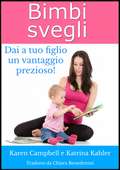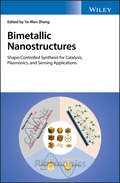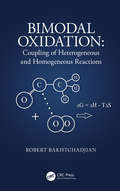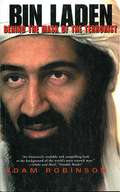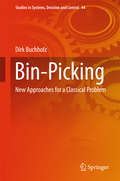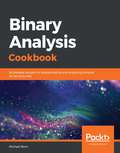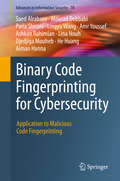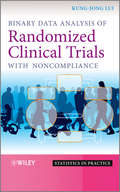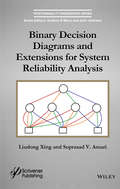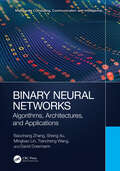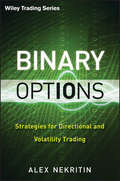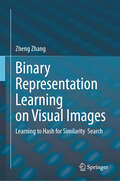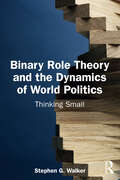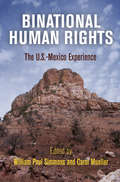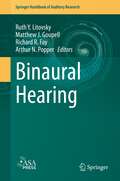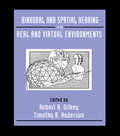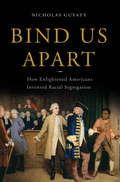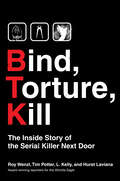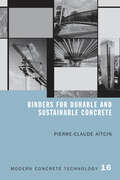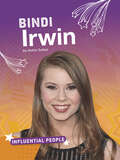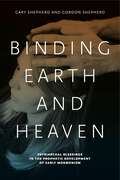- Table View
- List View
Bimbi Svegli - Dai a tuo figlio un vantaggio prezioso!
by Karen Campbell Chiara BenedettiniIl periodo che va dalla nascita agli otto anni, in particolare da zero a tre anni, è cruciale per lo sviluppo cerebrale del bambino. E' questo il periodo ideale per imparare. "Bimbi svegli" ti spiega come poter insegnare a tuo figlio a leggere, con l'ausilio di schede e attività didattiche. Questo libro fornisce, inoltre, numerose idee per far comprendere ai bambini i concetti matematici di base e stimolare la loro mente. Il genitore potrà altresì, grazie a questo libro, promuovere lo sviluppo motorio del proprio figlio, attraverso semplici esercizi. Karen Campbell e Katrina Kahler , insegnanti con grande esperienza ed esperte di pedagogia, spiegano in questo volume come sviluppare in pieno il potenziale del bambino. Aspettare che siano gli insegnanti della scuola elementare a stimolare il bambino, significa sprecare i suoi anni migliori per imparare e sviluppare connesioni neuronali. Inizia subito a favorire lo sviluppo di tuo figlio.
Bimetallic Nanostructures: Shape-Controlled Synthesis for Catalysis, Plasmonics, and Sensing Applications
by Ya-Wen ZhangSystematically summarizes the current status and recent advances in bimetallic structures, their shape-controlled synthesis, properties, and applications Intensive researches are currently being carried out on bimetallic nanostructures, focusing on a number of fundamental, physical, and chemical questions regarding their synthesis and properties. This book presents a systematic and comprehensive summary of the current status and recent advances in this field, supporting readers in the synthesis of model bimetallic nanoparticles, and the exploration and interpretation of their properties. Bimetallic Nanostructures: Shape-Controlled Synthesis for Catalysis, Plasmonics and Sensing Applications is divided into three parts. Part 1 introduces basic chemical and physical knowledge of bimetallic structures, including fundamentals, computational models, and in situ characterization techniques. Part 2 summarizes recent developments in synthetic methods, characterization, and properties of bimetallic structures from the perspective of morphology effect, including zero-dimensional nanomaterials, one-dimensional nanomaterials, and two-dimensional nanomaterials. Part 3 discusses applications in electrocatalysis, heterogeneous catalysis, plasmonics and sensing. Comprehensive reference for an important multidisciplinary research field Thoroughly summarizes the present state and latest developments in bimetallic structures Helps researchers find optimal synthetic methods and explore new phenomena in surface science and synthetic chemistry of bimetallic nanostructures Bimetallic Nanostructures: Shape-Controlled Synthesis for Catalysis, Plasmonics and Sensing Applications is an excellent source or reference for researchers and advanced students. Academic researchers in nanoscience, nanocatalysis, and surface plasmonics, and those working in industry in areas involving nanotechnology, catalysis and optoelectronics, will find this book of interest.
Bimodal Oxidation: Coupling of Heterogeneous and Homogeneous Reactions
by Robert BakhtchadjianThis book is devoted to the problems of oxidation chemical reactions and addresses bimodal reaction sequences. Chemical reactions of oxidation, occurring under certain conditions and in multicomponent systems are complex processes. The process of the oxidation essentially changes in the presence and contact of the solid substances with reactants. The role of solid substances and the appearance of this phenomenon in oxidation reaction are discussed. The reader will understand the "driving forces" of this phenomenon and apply it in practice. Written for chemists, physicists, biologists and engineers working in the domain of oxidation reactions. Key Selling Features: Covers the historical background, modern state of the art, and perspectives in investigations of the coupling between heterogeneous and homogeneous reactions Discusses the feasible pathways of the coupling of heterogeneous and homogeneous reactions in oxidation in man-made and natural chemical systems Addresses the abundance, peculiarities and mechanisms of the bimodal reaction sequences in oxidation with dioxygen in recent decades Discusses the existence of the bimodal reaction sequences in chemical systems investigations in atmospheric chemistry and heterogeneous photocatalysis Presented in a simple concise style, accessible for both specialists and non-specialists
Bin Laden, Islam, & America's New War on Terrorism
by As'Ad AbukhalilLebanese scholar As'ad AbuKhalil examines the roots of the September 11 crisis, the causes for antipathy toward the United States, and the historical relations between the U.S. and the Islamic world. AbuKhalil also reviews the background of U.S. entanglement with the Middle East, and how it catalyzed militant fundamentalist networks that came to perceive the United States as an enemy. Beginning with an introduction on the legacy of Western misconceptions about Islam and Arabs, the book focuses on Islamic fundamentalism and U.S. foreign policy, and the way both polarize the world into a "good and evil" "with us or against us" view. Drawing heavily from Arabic language sources, AbuKhalil discusses the rise of Osama bin Laden and al-Qaeda, the Saudi connection, the Arab-Israeli conflict, Afghanistan, Pakistan, and the regional implications of the American "War On Terrorism."
Bin Laden: Behind the Mask of a Terrorist
by Adam RobinsonOn the eve of the tenth anniversary of the 9/11 terrorist attacks in New York City, Osama bin Laden is still a vivid symbol of outrage and tragedy in the American imagination. One of the most-recognized faces of terror, bin Laden has presented himself to the world as a paragon of ascetic virtue. Journalist Adam Robinson tells a far different story. This authoritative biography lifts bin Laden's mask of moral purity as it recounts his transformation from dissolute rich kid into terrorist mastermind. Drawing on information from members of bin Laden's own family and extensive independent research in Saudi Arabia, Lebanon, Oman, Libya, and Pakistan, Robinson opens a window into the man who changed the face of global politics.
Bin ich etwas Besonderes?: Was uns von den Tieren unterscheidet – und was nicht
by Adam RutherfordVor etwa 45.000 Jahren haben wir Menschen uns mit der Schaffung von Kultur, Werkzeugen, Symbolik und Kunst von unseren Vorfahren und Ursprüngen entfernt. Diese „kognitive Revolution“ gab uns das Gefühl, dass wir etwas Besonderes sind. Schriftsteller, Wissenschaftler, Philosophen und Religionen staunen seit Jahrtausenden über unsere Brillanz. Dennoch sind wir mit dem Rest der Natur durch Gene, Anatomie und Physiologie verbunden und in einer gemeinsamen Evolution verwurzelt. Alle Arten sind einzigartig, aber sind wir einzigartiger als andere Tiere? Diese Frage geht an die Wurzel dessen, was wir sind. Doch viele wissenschaftliche Erkenntnisse haben im Laufe der Zeit Zweifel an der Sonderstellung des Menschen aufkommen lassen. Dinge, die wir einst als einzigartig menschlich betrachtet haben, sind es nicht. Wir sind nicht die einzige Spezies, die z.B. Pläne für die Zukunft schmiedet, vergangene Entscheidungen bereut, um verlorene Leben trauert und Sex aus anderen Gründen als der Zeugung von Nachkommen hat.
Bin-Picking: New Approaches for a Classical Problem (Studies in Systems, Decision and Control #44)
by Dirk BuchholzThis bookis devoted to one of the most famous examples of automation handling tasks -the "bin-picking" problem. To pick up objects, scrambled in a box is aneasy task for humans, but its automation is very complex. In this book threedifferent approaches to solve the bin-picking problem are described, showinghow modern sensors can be used for efficient bin-picking as well as how classicsensor concepts can be applied for novel bin-picking techniques. 3D pointclouds are firstly used as basis, employing the known Random Sample Matchingalgorithm paired with a very efficient depth map based collision avoidancemechanism resulting in a very robust bin-picking approach. Reducing thecomplexity of the sensor data, all computations are then done on depth maps. This allows the use of 2D image analysis techniques to fulfill the tasks andresults in real time data analysis. Combined with force/torque and accelerationsensors, a near time optimal bin-picking system emerges. Lastly, surface normalmaps are employed as a basis for pose estimation. In contrast to knownapproaches, the normal maps are not used for 3D data computation but directlyfor the object localization problem, enabling the application of a new class ofsensors for bin-picking.
Binary Analysis Cookbook: Actionable recipes for disassembling and analyzing binaries for security risks
by Michael BornExplore open-source Linux tools and advanced binary analysis techniques to analyze malware, identify vulnerabilities in code, and mitigate information security risks Key Features Adopt a methodological approach to binary ELF analysis on Linux Learn how to disassemble binaries and understand disassembled code Discover how and when to patch a malicious binary during analysis Book Description Binary analysis is the process of examining a binary program to determine information security actions. It is a complex, constantly evolving, and challenging topic that crosses over into several domains of information technology and security. This binary analysis book is designed to help you get started with the basics, before gradually advancing to challenging topics. Using a recipe-based approach, this book guides you through building a lab of virtual machines and installing tools to analyze binaries effectively. You'll begin by learning about the IA32 and ELF32 as well as IA64 and ELF64 specifications. The book will then guide you in developing a methodology and exploring a variety of tools for Linux binary analysis. As you advance, you'll learn how to analyze malicious 32-bit and 64-bit binaries and identify vulnerabilities. You'll even examine obfuscation and anti-analysis techniques, analyze polymorphed malicious binaries, and get a high-level overview of dynamic taint analysis and binary instrumentation concepts. By the end of the book, you'll have gained comprehensive insights into binary analysis concepts and have developed the foundational skills to confidently delve into the realm of binary analysis. What you will learn Traverse the IA32, IA64, and ELF specifications Explore Linux tools to disassemble ELF binaries Identify vulnerabilities in 32-bit and 64-bit binaries Discover actionable solutions to overcome the limitations in analyzing ELF binaries Interpret the output of Linux tools to identify security risks in binaries Understand how dynamic taint analysis works Who this book is for This book is for anyone looking to learn how to dissect ELF binaries using open-source tools available in Linux. If you're a Linux system administrator or information security professional, you'll find this guide useful. Basic knowledge of Linux, familiarity with virtualization technologies and the working of network sockets, and experience in basic Python or Bash scripting will assist you with understanding the concepts in this book
Binary Code Fingerprinting for Cybersecurity: Application to Malicious Code Fingerprinting (Advances in Information Security #78)
by He Huang Lingyu Wang Mourad Debbabi Amr Youssef Djedjiga Mouheb Saed Alrabaee Paria Shirani Ashkan Rahimian Lina Nouh Aiman HannaThis book addresses automated software fingerprinting in binary code, especially for cybersecurity applications. The reader will gain a thorough understanding of binary code analysis and several software fingerprinting techniques for cybersecurity applications, such as malware detection, vulnerability analysis, and digital forensics. More specifically, it starts with an overview of binary code analysis and its challenges, and then discusses the existing state-of-the-art approaches and their cybersecurity applications. Furthermore, it discusses and details a set of practical techniques for compiler provenance extraction, library function identification, function fingerprinting, code reuse detection, free open-source software identification, vulnerability search, and authorship attribution. It also illustrates several case studies to demonstrate the efficiency, scalability and accuracy of the above-mentioned proposed techniques and tools. This book also introduces several innovative quantitative and qualitative techniques that synergistically leverage machine learning, program analysis, and software engineering methods to solve binary code fingerprinting problems, which are highly relevant to cybersecurity and digital forensics applications. The above-mentioned techniques are cautiously designed to gain satisfactory levels of efficiency and accuracy. Researchers working in academia, industry and governmental agencies focusing on Cybersecurity will want to purchase this book. Software engineers and advanced-level students studying computer science, computer engineering and software engineering will also want to purchase this book.
Binary Data Analysis of Randomized Clinical Trials with Noncompliance
by Kung-Jong LuiIt is quite common in a randomized clinical trial (RCT) to encounter patients who do not comply with their assigned treatment. Since noncompliance often occurs non-randomly, the commonly-used approaches, including both the as-treated (AT) and as-protocol (AP) analysis, and the intent-to-treat (ITT) (or as-randomized) analysis, are all well known to possibly produce a biased inference of the treatment efficacy.This book provides a systematic and organized approach to analyzing data for RCTs with noncompliance under the most frequently-encountered situations. These include parallel sampling, stratified sampling, cluster sampling, parallel sampling with subsequent missing outcomes, and a series of dependent Bernoulli sampling for repeated measurements. The author provides a comprehensive approach by using contingency tables to illustrate the latent probability structure of observed data. Using real-life examples, computer-simulated data and exercises in each chapter, the book illustrates the underlying theory in an accessible, and easy to understand way.Key features:Consort-flow diagrams and numerical examples are used to illustrate the bias of commonly used approaches, such as, AT analysis, AP analysis and ITT analysis for a RCT with noncompliance.Real-life examples are used throughout the book to explain the practical usefulness of test procedures and estimators.Each chapter is self-contained, allowing the book to be used as a reference source.Includes SAS programs which can be easily modified in calculating the required sample size.Biostatisticians, clinicians, researchers and data analysts working in pharmaceutical industries will benefit from this book. This text can also be used as supplemental material for a course focusing on clinical statistics or experimental trials in epidemiology, psychology and sociology.
Binary Decision Diagrams and Extensions for System Reliability Analysis
by Suprasad V. Amari Liudong XingRecent advances in science and technology have made modern computing and engineering systems more powerful and sophisticated than ever. The increasing complexity and scale imply that system reliability problems not only continue to be a challenge but also require more efficient models and solutions. This is the first book systematically covering the state-of-the-art binary decision diagrams and their extended models, which can provide efficient and exact solutions to reliability analysis of large and complex systems. The book provides both basic concepts and detailed algorithms for modelling and evaluating reliability of a wide range of complex systems, such as multi-state systems, phased-mission systems, fault-tolerant systems with imperfect fault coverage, systems with common-cause failures, systems with disjoint failures, and systems with functional dependent failures. These types of systems abound in safety-critical or mission-critical applications such as aerospace, circuits, power systems, medical systems, telecommunication systems, transmission systems, traffic light systems, data storage systems, and etc. The book provides both small-scale illustrative examples and large-scale benchmark examples to demonstrate broad applications and advantages of different decision diagrams based methods for complex system reliability analysis. Other measures including component importance and failure frequency are also covered. A rich set of references is cited in the book, providing helpful resources for readers to pursue further research and study of the topics. The target audience of the book is reliability and safety engineers or researchers. The book can serve as a textbook on system reliability analysis. It can also serve as a tutorial and reference book on decision diagrams, multi-state systems, phased-mission systems, and imperfect fault coverage models.
Binary Neural Networks: Algorithms, Architectures, and Applications (Multimedia Computing, Communication and Intelligence)
by David Doermann Sheng Xu Baochang Zhang Mingbao Lin Tiancheng WangDeep learning has achieved impressive results in image classification, computer vision, and natural language processing. To achieve better performance, deeper and wider networks have been designed, which increase the demand for computational resources. The number of floatingpoint operations (FLOPs) has increased dramatically with larger networks, and this has become an obstacle for convolutional neural networks (CNNs) being developed for mobile and embedded devices. In this context, Binary Neural Networks: Algorithms, Architectures, and Applications will focus on CNN compression and acceleration, which are important for the research community. We will describe numerous methods, including parameter quantization, network pruning, low-rank decomposition, and knowledge distillation. More recently, to reduce the burden of handcrafted architecture design, neural architecture search (NAS) has been used to automatically build neural networks by searching over a vast architecture space. Our book will also introduce NAS and binary NAS and its superiority and state-of-the-art performance in various applications, such as image classification and object detection. We also describe extensive applications of compressed deep models on image classification, speech recognition, object detection, and tracking. These topics can help researchers better understand the usefulness and the potential of network compression on practical applications. Moreover, interested readers should have basic knowledge of machine learning and deep learning to better understand the methods described in this book. Key Features • Reviews recent advances in CNN compression and acceleration • Elaborates recent advances on binary neural network (BNN) technologies • Introduces applications of BNN in image classification, speech recognition, object detection, and more Baochang Zhang is a full professor with the Institute of Artificial Intelligence, Beihang University, Beijing, China. He was selected by the Program for New Century Excellent Talents in the University of Ministry of Education of China, chosen as the Academic Advisor of the Deep Learning Lab of Baidu Inc., and was honored as a Distinguished Researcher of Beihang Hangzhou Institute in Zhejiang Province. His research interests include explainable deep learning, computer vision, and pattern recognition. His HGPP and LDP methods were state-of-the-art feature descriptors, with 1234 and 768 Google Scholar citations, respectively, and both “Test-of-Time” works. His team’s 1-bit methods achieved the best performance on ImageNet. His group also won the ECCV 2020 Tiny Object Detection, COCO Object Detection, and ICPR 2020 Pollen recognition challenges. Sheng Xu received a BE in automotive engineering from Beihang University, Beijing, China. He has a PhD and is currently at the School of Automation Science and Electrical Engineering, Beihang University, specializing in computer vision, model quantization, and compression. He has made significant contributions to the field and has published about a dozen papers as the first author in top-tier conferences and journals such as CVPR, ECCV, NeurIPS, AAAI, BMVC, IJCV, and ACM TOMM. Notably, he has 4 papers selected as oral or highlighted presentations by these prestigious conferences. Furthermore, Dr. Xu actively participates in the academic community as a reviewer for various international journals and conferences, including CVPR, ICCV, ECCV, NeurIPS, ICML, and IEEE TCSVT. His expertise has also led to his group’s victory in the ECCV 2020 Tiny Object Detection Challenge. Mingbao Lin finished his MS-PhD study and obtained a PhD in intelligence science and technology from Xiamen University, Xiamen, China in 2022. In 2016, he received a BS from Fuzhou University, Fuzhou, China. He is currently a senior researcher with the Tencent Youtu Lab, Shanghai, China. His publications on top-tier conferences/journals include: IEEE TP
Binary Options
by Alex NekritinThe first comprehensive guide to trading a unique class of options to manage risk and make smarter bets during volatile tradingProviding savvy market players with a way to react quickly to event-driven opportunities and trends, exchange traded binary options are a unique type of derivative instrument offering fixed risk and reward. Available on four asset classes--stock index futures, commodity futures, Spot Forex and economic data releases--they are distinctly different from regular put/call options in that their pay-out structure offers only two potential outcomes, or settlement values: 0 or 100. The first guide focussing exclusively on this fast-growing sector of the options market, Trading Binary Options examines the key differences between regular options trading and binary options trading and describes how binary trading is done. It also gives you the lowdown on the most successful binary trading strategies and how and when they should be deployed. Outlines a rigorous approach to trading directionally around specific events, such as an earnings release, a shift in currencies, or a release of economic dataProvides the first comprehensive coverage of an increasingly popular but poorly understood trading instrumentOffers in-depth discussions of the six characteristics that distinguish binaries from other options and that make them such an attractive vehicle for hedging risk and improving returns
Binary Representation Learning on Visual Images: Learning to Hash for Similarity Search
by Zheng ZhangThis book introduces pioneering developments in binary representation learning on visual images, a state-of-the-art data transformation methodology within the fields of machine learning and multimedia. Binary representation learning, often known as learning to hash or hashing, excels in converting high-dimensional data into compact binary codes meanwhile preserving the semantic attributes and maintaining the similarity measurements. The book provides a comprehensive introduction to the latest research in hashing-based visual image retrieval, with a focus on binary representations. These representations are crucial in enabling fast and reliable feature extraction and similarity assessments on large-scale data. This book offers an insightful analysis of various research methodologies in binary representation learning for visual images, ranging from basis shallow hashing, advanced high-order similarity-preserving hashing, deep hashing, as well as adversarial and robust deep hashing techniques. These approaches can empower readers to proficiently grasp the fundamental principles of the traditional and state-of-the-art methods in binary representations, modeling, and learning. The theories and methodologies of binary representation learning expounded in this book will be beneficial to readers from diverse domains such as machine learning, multimedia, social network analysis, web search, information retrieval, data mining, and others.
Binary Role Theory and the Dynamics of World Politics: Thinking Small
by Stephen G. WalkerThis book develops a binary role theory of world politics extending from the micro-analysis of foreign policy to the macro-analysis of world politics. The effort employs analytical tools outside of role theory to extend role concepts from agents spatially to finitely generated systems and temporally to different phases and sequences of social interaction between pairs of agents as ego and alter. There is an initial emphasis on “thinking small” about the interactions of agents as the building blocks of world politics and then tracing the processes of aggregation that generate the emergence and evolution of larger patterns of international relations over time.Empirical case studies from different historical eras and geographical regions illustrate the application of binary role theory models to problems of conflict management, alliance formation, diplomatic engagement, and transitions in world order. The analysis employs complex adaptive systems (CAS) analysis to go beyond the study of political science in building bridges to the natural sciences by using concepts and models from the Standard Model in physics and the Modern Synthesis in biology. This book will interest an audience of foreign policy scholars and international relations theorists as well as students of quantum and computational models of world politics.
Binational Human Rights: The U.S.-Mexico Experience (Pennsylvania Studies in Human Rights)
by William Paul Simmons Carol MuellerMexico ranks highly on many of the measures that have proven significant for creating a positive human rights record, including democratization, good health and life expectancy, and engagement in the global economy. Yet the nation's most vulnerable populations suffer human rights abuses on a large scale, such as gruesome killings in the Mexican drug war, decades of violent feminicide, migrant deaths in the U.S. desert, and the ongoing effects of the failed detention and deportation system in the States. Some atrocities have received extensive and sensational coverage, while others have become routine or simply ignored by national and international media. Binational Human Rights examines both well-known and understudied instances of human rights crises in Mexico, arguing that these abuses must be understood not just within the context of Mexican policies but in relation to the actions or inactions of other nations—particularly the United States.The United States and Mexico share the longest border in the world between a developed and a developing nation; the relationship between the two nations is complex, varied, and constantly changing, but the policies of each directly affect the human rights situation across the border. Binational Human Rights brings together leading scholars and human rights activists from the United States and Mexico to explain the mechanisms by which a perfect storm of structural and policy factors on both sides has led to such widespread human rights abuses. Through ethnography, interviews, and legal and economic analysis, contributors shed new light on the feminicides in Ciudad Juárez, the drug war, and the plight of migrants from Central America and Mexico to the United States. The authors make clear that substantial rhetorical and structural shifts in binational policies are necessary to significantly improve human rights.Contributors: Alejandro Anaya Muñoz, Luis Alfredo Arriola Vega, Timothy J. Dunn, Miguel Escobar-Valdez, Clara Jusidman, Maureen Meyer, Carol Mueller, Julie A. Murphy Erfani, William Paul Simmons, Kathleen Staudt, Michelle Téllez.
Binaural Hearing: With 93 Illustrations (Springer Handbook of Auditory Research #73)
by Arthur N. Popper Richard R. Fay Ruth Y. Litovsky Matthew J. GoupellThe field of Binaural Hearing involves studies of auditory perception, physiology, and modeling, including normal and abnormal aspects of the system. Binaural processes involved in both sound localization and speech unmasking have gained a broader interest and have received growing attention in the published literature. The field has undergone some significant changes. There is now a much richer understanding of the many aspects that comprising binaural processing, its role in development, and in success and limitations of hearing-aid and cochlear-implant users.The goal of this volume is to provide an up-to-date reference on the developments and novel ideas in the field of binaural hearing. The primary readership for the volume is expected to be academic specialists in the diverse fields that connect with psychoacoustics, neuroscience, engineering, psychology, audiology, and cochlear implants. This volume will serve as an important resource by way of introduction to the field, in particular for graduate students, postdoctoral scholars, the faculty who train them and clinicians.
Binaural and Spatial Hearing in Real and Virtual Environments
by Robert H. Gilkey Timothy R. AndersonThe current popular and scientific interest in virtual environments has provided a new impetus for investigating binaural and spatial hearing. However, the many intriguing phenomena of spatial hearing have long made it an exciting area of scientific inquiry. Psychophysical and physiological investigations of spatial hearing seem to be converging on common explanations of underlying mechanisms. These understandings have in turn been incorporated into sophisticated yet mathematically tractable models of binaural interaction. Thus, binaural and spatial hearing is one of the few areas in which professionals are soon likely to find adequate physiological explanations of complex psychological phenomena that can be reasonably and usefully approximated by mathematical and physical models. This volume grew out of the Conference on Binaural and Spatial Hearing, a four-day event held at Wright-Patterson Air Force Base in response to rapid developments in binaural and spatial hearing research and technology. Meant to be more than just a proceedings, it presents chapters that are longer than typical proceedings papers and contain considerably more review material, including extensive bibliographies in many cases. Arranged into topical sections, the chapters represent major thrusts in the recent literature. The authors of the first chapter in each section have been encouraged to take a broad perspective and review the current state of literature. Subsequent chapters in each section tend to be somewhat more narrowly focused, and often emphasize the authors' own work. Thus, each section provides overview, background, and current research on a particular topic. This book is significant in that it reviews the important work during the past 10 to 15 years, and provides greater breadth and depth than most of the previous works.
Bind Us Apart: How Enlightened Americans Invented Racial Segregation
by Nicholas GuyattWhy did the Founding Fathers fail to include blacks and Indians in their cherished proposition that “all men are created equal”? Racism is the usual answer. Yet Nicholas Guyatt argues in Bind Us Apart that white liberals from the founding to the Civil War were not confident racists, but tortured reformers conscious of the damage that racism would do to the nation. Many tried to build a multiracial America in the early nineteenth century, but ultimately adopted the belief that non-whites should create their own republics elsewhere: in an Indian state in the West, or a colony for free blacks in Liberia. Herein lie the origins of “separate but equal.”Essential reading for anyone hoping to understand today's racial tensions, Bind Us Apart reveals why racial justice in the United States continues to be an elusive goal: despite our best efforts, we have never been able to imagine a fully inclusive, multiracial society.
Bind, Torture, Kill: The Inside Story of BTK, the Serial Killer Next Door
by L. Kelly Roy Wenzl Tim Potter Hurst LavianaFor thirty-one years, a monster terrorized the residents of Wichita, Kansas. A bloodthirsty serial killer, self-named "BTK"—for "bind them, torture them, kill them"—he slaughtered men, women, and children alike, eluding the police for decades while bragging of his grisly exploits to the media. The nation was shocked when the fiend who was finally apprehended turned out to be Dennis Rader—a friendly neighbor . . . a devoted husband . . . a helpful Boy Scout dad . . . the respected president of his church.Written by four award-winning crime reporters who covered the story for more than twenty years, Bind, Torture, Kill is the most intimate and complete account of the BTK nightmare told by the people who were there from the beginning. With newly released documents, evidence, and information—and with the full cooperation, for the very first time, of the Wichita Police Department’s BTK Task Force—the authors have put all the pieces of the grisly puzzle into place, thanks to their unparalleled access to the families of the killer and his victims.
Binders for Durable and Sustainable Concrete (Modern Concrete Technology)
by Pierre-Claude AitcinLinking theory to practice, this book provides a better fundamental understanding of Portland cement and hydraulic binders which is necessary to make better concrete. It has been clearly demonstrated that concrete durability is closely linked to its water/binder ratio and proper curing during the first week after casting. In this rigorously present
Bindhunu bilindha: බිඳුණු බිළිඳා
by Dilipa Jayakodi — දිලීප ජයකොඩිතමාගේ මව. පියා සහ තවත් වැඩිහිටියන් ගණනාවක් අතින් අපචාරයට ලක්වූ අට හැවිරිදි දැරියකගේ හද සසල කරවන අනුවේදනීය සත්ය කතාවකි.
Bindi Irwin (Influential People Ser.)
by Golriz GolkarBindi Irwin presents on television about animals and conservation. Learn about how she overcame tragedy to find success!
Binding Earth and Heaven: Patriarchal Blessings in the Prophetic Development of Early Mormonism
by Gary Shepherd Gordon ShepherdIn Binding Earth and Heaven, Gary Shepherd and Gordon Shepherd use early nineteenth-century Mormonism as a case study to examine questions about how new religious movements may, as rare exceptions, survive and even eventually become successful in spite of intense opposition. Initial scorn and contempt for Mormonism—the fledgling creation of the young Joseph Smith—quickly elevated to mob violence as both Smith’s innovative teachings and converted followers proliferated, resulting in the widely held perception that the Mormons constituted a social menace. This book examines how Mormonism attracted and maintained the loyalty of increasing numbers of people despite mounting hostilities and severe hardships. The book focuses on the unique Mormon ritual (and accompanying doctrinal underpinnings) of “patriarchal blessings.” Patriarchal blessings were an innovative adaptation of the Old Testament practice of fathers making quasi-legal pronouncements over the heads of their sons—a way of verbally conferring rights, promises, admonition, and guidance to heirs. Binding Earth and Heaven shows how the organizational complexities of this practice contributed to strengthening and sustaining member faith and fealty, thereby bolstering the continuity and development of Mormonism.
Binding Earth and Heaven: Patriarchal Blessings in the Prophetic Development of Early Mormonism
by Gary Shepherd Gordon ShepherdIn Binding Earth and Heaven, Gary Shepherd and Gordon Shepherd use early nineteenth-century Mormonism as a case study to examine questions about how new religious movements may, as rare exceptions, survive and even eventually become successful in spite of intense opposition. Initial scorn and contempt for Mormonism—the fledgling creation of the young Joseph Smith—quickly elevated to mob violence as both Smith’s innovative teachings and converted followers proliferated, resulting in the widely held perception that the Mormons constituted a social menace. This book examines how Mormonism attracted and maintained the loyalty of increasing numbers of people despite mounting hostilities and severe hardships. The book focuses on the unique Mormon ritual (and accompanying doctrinal underpinnings) of “patriarchal blessings.” Patriarchal blessings were an innovative adaptation of the Old Testament practice of fathers making quasi-legal pronouncements over the heads of their sons—a way of verbally conferring rights, promises, admonition, and guidance to heirs. Binding Earth and Heaven shows how the organizational complexities of this practice contributed to strengthening and sustaining member faith and fealty, thereby bolstering the continuity and development of Mormonism.
